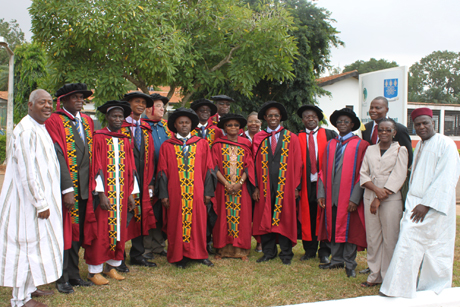New Ph.D.s improve plant production in West Africa
By Amanda Gurung

Eight sub-Saharan plant breeders from Nigeria, Niger, Mali, Burkina Faso and Ghana celebrated their new Ph.D.s from the West Africa Centre for Crop Improvement (WACCI) at the University of Ghana (UG) in July 2013.
WACCI was established in 2007 through a partnership between Cornell and UG, with funding from the Alliance for a Green Revolution in Africa (AGRA) to fill a critical shortage of plant breeders in West and sub-Saharan Africa.
Now, equipped with cutting-edge knowledge of genetics, plant breeding and molecular biology, the new Ph.D.s are improving the production of Africa’s most staple food crops to meet basic food and clothing needs.
“Despite efforts by respective governments ... daily per capita food consumption is below 2,000 kcal/day in the region,” says Vern Gracen, associate director of WACCI and Cornell adjunct professor of plant breeding and genetics. “The sub-Sahara region needs to increase crop production to help ensure food security, food safety and increase income in the agricultural sector. There are very few breeders within the sub-region with such training.”
Aissata Ibrahim, the first female WACCI Ph.D., surveyed 100 small-scale sorghum farmers in Niger to find that, despite availability of higher yielding varieties, farmers continue using less productive varieties that are preferred by their communities. “Cultivar improvement should therefore target characteristics of local varieties in the creation of new ones,” she says.

Ibrahim will expand hybrid sorghum production to farmer-preferred types in Niger.
Mamadou Coulibaly stresses that farmers play an integral part of a country’s agriculture strategy. Coming from the outside with new knowledge, plant breeders must listen to the farmer’s input.
“They know what would work and what would not,” he says. In his research at WACCI, Coulibaly responded to farmers’ concerns of drought by developing drought-tolerant maize hybrids that will increase production in Mali.
Ibrahim, Coulibaly and the six other graduates are developing solutions to food insecurity by applying scientific research to unique, region-specific, crop production constraints.
In the next five years, 46 more plant Ph.D.s are expected to graduate from WACCI. “The addition of 54 Ph.D. plant breeders to West Africa will have an enormous impact,” said Gracen, who spends six to eight months out of the year on the UG campus implementing plant-breeding curricula.
Resources from Mann Library and materials from the College of Agriculture and Life Sciences’ Transnational Learning Program are accessible to WACCI students as they research and develop improved crop varieties and agricultural practices.
Five years prior to the creation of WACCI, AGRA and Cornell helped develop a plant breeding graduate program at the African Center for Crop Improvement (ACCI) in South Africa. The success of ACCI in the South African region, the need for improved crops in other regions and the shortage of plant breeders in West and sub-Saharan Africa, drove the creation of WACCI.
Graduates will receive continued support from AGRA to apply their knowledge and training to breeding programs in their countries.
Amanda Gurung is a communications intern with International Programs in the College of Agriculture and Life Sciences.
Media Contact
Get Cornell news delivered right to your inbox.
Subscribe